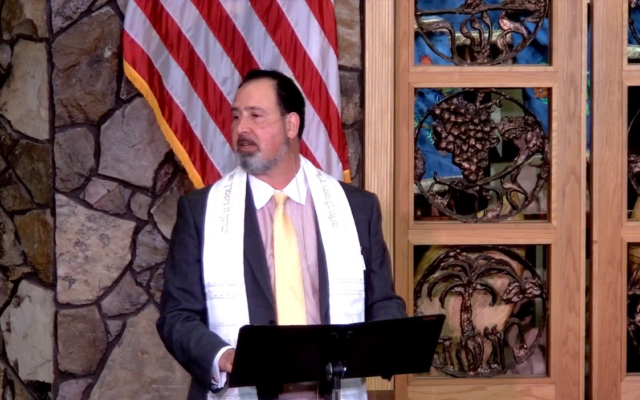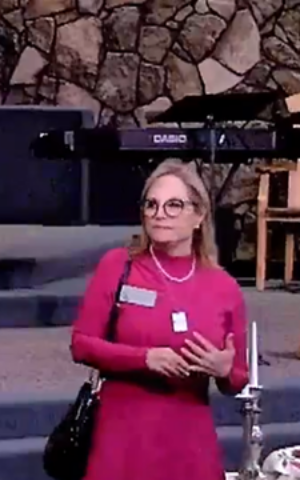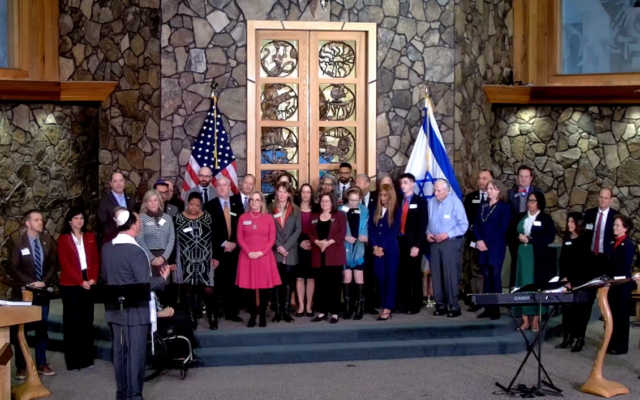Public Officials Break Bread with Jewish Community
The now annual event is seen as particularly valuable for legislators with relatively few Jewish constituents.
Dave Schechter is a veteran journalist whose career includes writing and producing reports from Israel and elsewhere in the Middle East.
Brent Cox is a Republican member of the Georgia House of Representatives, an evangelical Christian who calls supporting Israel a “core value” of his faith.
So, it was natural that Cox, whose district includes north Forsyth and Hall counties, would be among four dozen state legislators, judges and prosecutors, and county and local elected officeholders, who Jan. 12 broke bread with members of Temple Emanu-El and attended a Shabbat service.
This was the second year that the American Jewish Committee has brought together public officials with the Jewish community. Last year’s inaugural event was held at Congregation B’nai Torah. In addition to Temple Emanu-El, the outreach this year was expanded to include invitations to services Jan. 12 at Temple Beth Israel in Macon, Jan. 13 at Adas Yeshurun Synagogue in Augusta, and Jan. 27 at Congregation Mickve Israel in Savannah.
Such “soft” lobbying can be as effective as button-holing a legislator in the hallways at the state capitol. “It provides a more intimate experience for the elected officials to engage with members of the Jewish community,” said Dov Wilker, regional director of the AJC in Atlanta. “It also provides them a glimpse into the Jewish community, an opportunity to be part of a Jewish worship experience, to be at a synagogue, which most have not been to. It’s not just about issue, of antisemitism or Israel, but of the collective Jewish experience.”

Indeed, many state legislators, particularly among the Republicans, represent districts with relatively few Jewish constituents and, as such, may have little direct exposure to the Jewish community. All members of the 180-seat state House and the 56-seat Senate were invited to attend the services. Jews make up an estimated 1.2 percent of the Georgia population but an even smaller fraction of the General Assembly.
At a time when the Jewish community is reeling from public expressions of anti-Israel and/or anti-Jewish sentiment, stemming from Israel’s war against Hamas in Gaza, the effort to pass a bill defining antisemitism was a topic of conversation at numerous tables during the pre-service dinner.
This year’s General Assembly session, which began Jan. 8, will be the third effort to place into the state code a reference to the definition of antisemitism adopted by the International Holocaust Remembrance Alliance.
A year ago, a bill that overwhelmingly passed the House was withdrawn when members of the Senate attempted to amend wording already accepted by some two dozen states, 30 countries (including the U.S. government) and 1,100 organizations globally.
The IHRA definition reads: “Antisemitism is a certain perception of Jews, which may be expressed as hatred toward Jews. Rhetorical and physical manifestations of antisemitism are directed toward Jewish or non-Jewish individuals and/or their property, toward Jewish community institutions and religious facilities.”

The definition is controversial less for that wording than 11 accompanying examples of antisemitism. Several deal with Israel, including accusing Jews outside of Israel of dual loyalty, comparing Israel to Nazis, calling Israel “racist,” “denying the Jewish people their right to self-determination,” and applying standards to Israel “not expected or demanded of any other democratic nation.” Critics contend that those examples could be used to suppress debate about Israel.
In her pre-dinner remarks, Jewish Democratic state Rep. Esther Panitch, who represents a north Fulton County district, told how the event originated with the idea to invite small groups of legislators to her home for Shabbat dinner following her election in November 2022. Panitch’s co-host again this year was Republican state Rep. Todd Jones, who represents a district that includes south Forsyth and north Fulton counties, and whose mother is Jewish.
Among those notable by their presence was Fulton County District Attorney Fani Willis, who is prosecuting former President Donald Trump for alleged interference in the 2022 election.
Cox told the AJT that he was confident that the third time would be the charm for proponents of the IHRA definition, that a bill would clear the House and Senate and reach the desk of Republican Gov. Brian Kemp.

Cox visited Israel this past summer, leaving barely a month before the Oct. 7 Hamas-led attacks on kibbutzim, towns, and a music festival in Southern Israel, in which 1,200 people were killed and 240 kidnapped (of whom, at this writing, more 130 remain hostages in Gaza).
Learning of the attacks “felt like someone had just ripped part of my heart out,” he said. Cox spoke about his visit to the city of Sderot and how he later learned that several of the Israeli police he met there were killed in the Oct 7 attacks. He spoke with pride of visiting bomb shelters constructed by the Jewish National Fund with assistance from the multi-campus Free Chapel Church, where he is a member.
At the close of the service, Rabbi Spike Anderson offered a blessing for the legislators and other public officials gathered at the bimah:
“May you each be open to receiving the very best of who and what you are, and who and what you can be; both from your family and your ancestors; your education and your community; your past, your destiny, your dreams. May you live up to your full potential in what you are doing to better this country, to better this society and to better this world.”
To watch the program in full, visit www.facebook.com/TEAtlanta/videos
- News
- Local
- Dave Schechter
- Brent Cox
- Georgia House of Representatives
- Temple Emanu-El
- American Jewish Committee
- Congregation B'nai Torah
- Temple Beth Israel
- Adas Yeshurun Synagogue
- Congregation Mickve Israel
- Dov Wilker
- International Holocaust Remembrance Alliance
- Esther Panitch
- Todd Jones
- Fulton County District Attorney Fani Willis
- Brian Kemp
- Rabbi Spike Anderson




comments